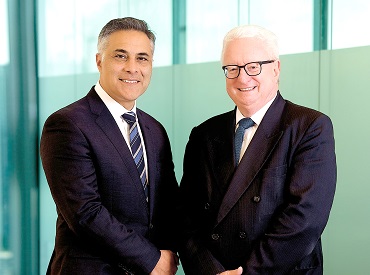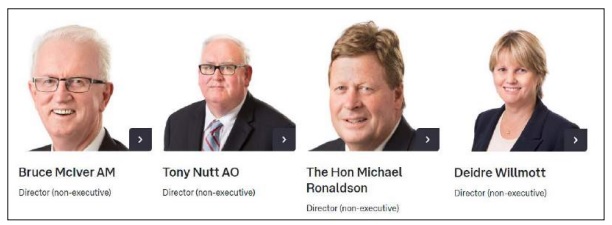1 Feb.—The manufactured scandal that saw Christine Holgate removed as Chief Executive Officer of Australia Post has begun to unravel, and Labor has decided to head for the exit. Following the 22 January release of the Maddocks Report that despite its authors’ best efforts cleared Holgate of having misused public money to buy luxury watches in 2018, and amid a barrage of increasingly scathing media commentary, Shadow Assistant Treasurer Stephen Jones on Friday made statements to the media denouncing Prime Minister Scott Morrison’s “confected outrage” over the affair (p. 1). Jones’s attack is disingenuous given that it was Labor Senator Kimberley Kitching’s deliberate misrepresentation of Holgate’s spending during an October 2020 Senate Estimates hearing, followed by a misleading question to Morrison from Opposition Leader Anthony Albanese later that day, that set the scene for Morrison’s histrionics.1 Moreover, there is good reason to suspect that exactly the same thing would be happening were the two parties’ roles reversed. The Liberals have been relatively open about their desire to privatise Australia Post, for which its dysfunction under Holgate’s predecessor Ahmed Fahour and past Chairman John Stanhope provided the perfect excuse—an excuse Holgate’s sterling performance as CEO took away. What Labor would now seem to prefer the public forget, however, is that both men were its own appointees, whose apparently deliberate campaign to run Australia Post into the ground Labor neither curtailed when in government nor complained about in opposition.

Former investment banker Fahour was recruited as Australia Post’s CEO by the government of Labor PM Kevin Rudd in late 2009, and commenced work in February 2010. Stanhope, a former chief financial officer of Telstra, was named chairman by Communications Minister Sen. Stephen Conroy in November 2012. By then Rudd had been replaced as PM by his erstwhile deputy Julia Gillard, self-proclaimed champion of what she called the “post-1983 consensus on economic reform”, the neoliberal dogma which among other things demands as many government-owned businesses and services as possible be sold off, on the premise that private enterprise is inherently “more efficient” than the public sector. The 23 November 2012 Sydney Morning Herald reported of Stanhope that having begun his career as a clerk at the PostmasterGeneral’s Department (forerunner to both Australia Post and Telstra) in 1967, “By 1995, he was Telstra’s director of finance and was deeply involved in the three-stage privatisation of the telco and the marathon negotiation that culminated last year in Telstra’s agreement to take part in the national broadband project. … Australia Post is also becoming a long-range privatisation contender. The government has not flagged a sale, but Mr Stanhope is well schooled in the process.” (Emphasis added.) Unsurprisingly, the Liberals left him in place when they returned to government in 2013, and later reappointed him. He retired in November 2019.
Books cooked
Stanhope’s arrival coincided with a slump in profits which culminated in a $222 million loss in 2015, Australia Post’s first since it was corporatised in 1975. Fahour attributed this to a reduction in the posting of ordinary letters, which had dropped 10.3 per cent that year and a total 36 per cent over the previous seven. Australia Post’s mail business was in such “terminal and structural decline”, Fahour told the 25 September 2015 Australian Financial Review, that its losses had more than wiped out the profits from the company’s parcel-delivery and retail businesses. “But the Communication Workers’ Union (CWU) … said the financial figures were not as bad as they appeared”, AFR reported. “The $222 million net loss includes provisions of $190 million to pay for the retraining and redeployment of employees working in the postal group’s letters operations as it restructures its letters services, and for possible redundancies.” (Emphasis added.) “Provisions” are funds set aside against expected losses, which may or may not ever be realised. Which is to say, almost the entire loss supposedly caused by the mail business’s collapse was artificially and arbitrarily imposed because it was presumed to be collapsing—the very epitome of a self-fulfilling prophecy. Two years later, the AFR revealed that this was not the only trick Fahour pulled to tarnish the mail business. “As Christine Holgate does her due diligence ahead of taking the reins [as CEO] … she will discover a confusing mess of segment performance numbers in the organisation’s annual reports”, reported AFR business columnist Tony Boyd on 6 July 2017. According to banking analyst William Ammentorp, who had examined Australia Post’s financial statements on AFR’s behalf, “since Fahour took over as CEO … [Australia Post] has restated its segment revenues, expenses and earnings before interest and tax 49 times”, Boyd reported. “In the previous five years before his appointment the accounts were restated just once.”
A restatement is a revision and re-release of a prior financial statement. Normally, they are done to correct a material misstatement; here, the purpose appears to have been to perpetrate one. “The constant restatements make it difficult for outside observers of Australia Post to ascertain the true performance of three key businesses—letters, parcels and retail”, Boyd wrote. “[W]hile the restatements did not impact the bottom-line-reported results of Australia Post, they did change the reported financial performance of the operating segments … [resulting] in generally adverse outcomes for letters, positive outcomes for parcels and retail and large swings for ‘unallocated’, Ammentorp says.” Peter Wells, professor of accounting at the University of Technology Sydney, backed up Ammentorp’s analysis. “This raises legitimate questions about whether the restatements were done to make the performance of letters look worse”, he said, at a time when Fahour was campaigning (successfully) to raise the price of postage to $1 per standard letter. AFR reported separately that Fahour had also “had his old employer Boston Consulting [Group] prepare a report for then-Communications Minister [Malcolm] Turnbull; it projected Post’s losses would grow to $12 billion for letters and $6.6 billion overall within a decade to help make the case.”
Chairman Stanhope, meanwhile, was continuing to push for privatisation. Following a recommendation to that effect the previous week by the government’s Commission of Audit, Stanhope told media at a 6 May 2014 trans-Tasman business luncheon in Melbourne that there was “no reason ‘not to [privatise]…. It doesn’t need to be [government-owned]’”, Perth’s Radio 6PR reported. Among the “other powerful supporters” of privatisation named in that report was Stanhope’s immediate predecessor David Mortimer, who had appointed Fahour CEO.
In a media release the next day, the Communications, Electrical and Plumbing Union (CEPU), which represents postal workers, noted in response that not only had Turnbull explicitly rejected privatisation on multiple occasions, but “Mr Stanhope’s comments also fly in the face of public opinion and the views of Australia Post’s workforce. ‘When the idea of privatising Australia Post was floated in January, 69 per cent of voters rejected it outright in an Essential poll. In contrast just 20 per cent supported the idea’, [New South Wales CEPU Secretary Jim] Metcher said today. … ‘In this context it is bizarre that Australia’s Post Chairman would be wading into a contested public debate spouting an ideological view of a public-owned asset that is so out of step with the people he represents— the Australian taxpayer’, he said.”
Fahour for his part bailed out as CEO in 2017 amid public outrage at his bloated $5.6 million salary that year (which together with bonuses and a $4 million severance package saw him depart with a $10.8 million payout) while he cut services and sacked hundreds of workers—a revelation forced, ironically enough, by Victorian Liberal Sen. James Paterson, who as chair of the Senate Environment and Communications Committee had bowed to growing public outcry and denied Stanhope’s bid to keep Fahour’s and other executives’ pay secret, as they had for the previous two years. Until then, neither major party had ever submitted Australia Post’s corporate practices to the “pub test”, apparently happy to let the board and executive effectively asset-strip the company to death to further their bipartisan privatisation agenda.
Board stacked
Like its attack on Morrison over the Cartier watches affair, Labor’s other Australia-post related criticism of the government—that, as Albanese put it in October, it has stacked the board with “failed Liberal politicians and Liberalconnected people”—is hypocritical, given Labor has historically done the same thing when in government. It is nonetheless valid given the board’s spineless compliance with Morrison’s smear campaign against Holgate, as evidenced by their throwing her to the wolves in their testimony to the “independent inquiry” by Maddocks Lawyers.2

Australia Post’s board comprises the CEO (who doubles as General Manager) and a maximum of eight non-executive directors, who are appointed by the Governor-General on the advice of the ministers for Communications and Finance (the “Shareholder Ministers”). Five of the present directors were on the board when Holgate purchased the watches in 2018, which they now claim they did not know about and would not have approved. Of those five, four are prominent Liberals. They are:
Bruce McIver AM, former President of the Liberal National Party of Queensland. According to the 31 January Australian he is among four current and former LNP executives facing a motion of suspension for conflict of interest, after working for United Australia Party leader Clive Palmer’s 2019 election campaign.
Tony Nutt AO, who had a 35-year career as a policy advisor to both state and federal Liberal governments, including as principal advisor to Prime Minister John Howard and chief of staff to Attorney-General Darryl Williams. He has also served the Liberal Party as both a federal and state (Victoria) director.
The Hon. Michael Ronaldson, a former Liberal Party Senator for the state of Victoria in 2005-16 and Member for Ballarat in 1990-2001. His cabinet posts included Minister for Veterans’ Affairs, Minister Assisting the Prime Minister for the Centenary of ANZAC, and Special Minister of State.
Deidre Willmott, former Cabinet Secretary and Chief of Staff to two Liberal premiers of Western Australia, Richard Court and Colin Barnett.
The ability of the government of the day to so blatantly stack the board of any state-owned enterprise— let alone an essential public service such as Australia Post—with its own partisan hacks, who then serve that government’s political agenda to the detriment of the company for which they are responsible, reinforces the Citizens Party’s longstanding argument that no such institution should ever be privatised, or even corporatised, but instead be operated as a public utility as Australia Post once was under the Postmaster-General’s Department. In the meantime, we reiterate our call for Holgate’s reinstatement, and that the corrupt board be replaced by politically independent directors who will run Australia Post in the public interest.
By Richard Bardon and Melissa Harrison, Australian Alert Service, 3 February 2021
Footnotes






